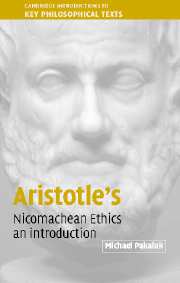Book contents
- Frontmatter
- Contents
- Preface
- 1 Reading Aristotle's Nicomachean Ethics
- 2 The goal of human life (Nicomachean Ethics, book 1)
- 3 Character-related virtue (Nicomachean Ethics 1.13 and book 2)
- 4 Actions as signs of character (Nicomachean Ethics 3.1–5)
- 5 Some particular character-related virtues (Nicomachean Ethics 3.6–4.9)
- 6 Justice as a character-related virtue (Nicomachean Ethics, book 5)
- 7 Thinking-related virtue (Nicomachean Ethics, book 6)
- 8 Akrasia, or failure of self-control (Nicomachean Ethics 7.1–10)
- 9 Friendship (Nicomachean Ethics, books 8 and 9)
- 10 Pleasure (Nicomachean Ethics 7.11–14 and 10.1–5)
- 11 Happiness (Nicomachean Ethics 10.6–9)
- References
- Index
5 - Some particular character-related virtues (Nicomachean Ethics 3.6–4.9)
Published online by Cambridge University Press: 05 June 2012
- Frontmatter
- Contents
- Preface
- 1 Reading Aristotle's Nicomachean Ethics
- 2 The goal of human life (Nicomachean Ethics, book 1)
- 3 Character-related virtue (Nicomachean Ethics 1.13 and book 2)
- 4 Actions as signs of character (Nicomachean Ethics 3.1–5)
- 5 Some particular character-related virtues (Nicomachean Ethics 3.6–4.9)
- 6 Justice as a character-related virtue (Nicomachean Ethics, book 5)
- 7 Thinking-related virtue (Nicomachean Ethics, book 6)
- 8 Akrasia, or failure of self-control (Nicomachean Ethics 7.1–10)
- 9 Friendship (Nicomachean Ethics, books 8 and 9)
- 10 Pleasure (Nicomachean Ethics 7.11–14 and 10.1–5)
- 11 Happiness (Nicomachean Ethics 10.6–9)
- References
- Index
Summary
Aristotle begins examining particular character-related virtues in 3.6. He looks first at courage, then self-mastery (or “moderation”), then generosity and magnificence, magnanimity and an unnamed virtue dealing with honor, before examining various minor social virtues. He reserves special treatment for the virtue of justice, which he considers a character-related virtue as well, but which he thinks is set apart in interesting ways from the others. I shall follow his practice and consider his treatment of justice separately, in the next chapter.
Let us review the argument once again. The reason why Aristotle wishes to examine the virtues, paying special attention to the sorts of actions a virtuous person does, is that he thinks that the ultimate goal of human life is some kind of action or activity that we can accomplish only through our having virtue. As was said, this goal should be understood as taking the form of an activity, repeated at intervals, which would rightly serve to organize and direct everything else that we do. But which activity of that sort should serve as our ultimate goal? It is that activity, Aristotle has argued, which satisfies the criteria of Ultimacy, Self-Sufficiency, and (perhaps) greatest Preferability. But we cannot determine which activity satisfies those criteria until we become clearer about the activities that are indeed distinctive of the various virtues. So this now is Aristotle's task, which he carries out in 3.6–6.13. He considers first character-related virtues, and then thinking-related virtues (in book 6).
- Type
- Chapter
- Information
- Aristotle's Nicomachean EthicsAn Introduction, pp. 151 - 180Publisher: Cambridge University PressPrint publication year: 2005



